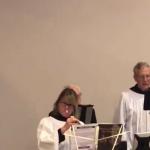 There is a species of literary juvenalia that goes looking for contradictions in great books or writers. Teach a semester on Plato and some youngling will discover that “soul” in Phaedo is used in a contradictory way with soul in Timaeus.
There is a species of literary juvenalia that goes looking for contradictions in great books or writers. Teach a semester on Plato and some youngling will discover that “soul” in Phaedo is used in a contradictory way with soul in Timaeus.
“Look,” runs the paper that writes itself, “a contradiction in Plato!”
Maybe, but usually not. The student reads, but badly.
This is most excellent as it allows the Professor to show that (just perhaps) the student has not discovered an error in one of the world’s great texts, but is actually not very good at reading books from different places and times. She then gets to help the student read more carefully and learn from great authors.
One can read the words and miss the meaning. Young readers often learn THE meaning of a term and then apply it woodenly to everything they read. They find contradictions easily, because they decode books as if there was not subtlety in language.
What is tolerable in the young is less excusable in the older. There are almost as many fevered list of Biblical contradictions from people with the literary sensitivity of a mechanical engineer who thinks writing “Jeebus” is the soul of wit as there are alt-right trolls on Twitter.
Let’s agree that contradictions can be bad. One should not hold “x” and “not x” at the same time (at least in many circumstances). However, in a complex literary work or collection of works (like the complete Plato or the Bible), a “contradiction” is going to be rare and hard to prove unless one reads looking for them while ignoring the rules of good reading.
Before crying “contradiction” here are five rules I suggest to my college freshmen:
Time Changes Things
If you say “X!” and then “NOT X!”, then you have contradicted yourself. This is generally a bad idea, though many of assertions have an implied date stamp. When we say “X!” we mean “X just now!”
Sometimes X is true and then it is not true. The Packers were the most recent Super Bowl winners and then they were not. Time passes and temporal truths pass from true to false and (God willing in the case of the Packers) to true again.
Authors Use Words in Different Ways Even in Their Own Works but often Very Differently from other Authors
Imagine one author saying “nobody can see God” and another author (in the same collection) saying someone saw God. If you read great books the way you read a list of phone numbers, then this is a contradiction!
Of course, if one pauses, considers, then one might wonder if the first author is using “see” in the same way the second author is. What if the one author is saying nobody can see God in God’s essence while the second is saying that one can see God in His actions or characteristics?
The man obsessed with finding a contradiction to justify his previous predilections learns nothing. Maybe he will mock the writer and feel confirmed in his superiority, but he will have nothing more to say.
The informed reader will see what is being said in context in each individual work. She will read charitably, because charity gives her new information. The distinction between God’s essence and God’s energies is interesting, but if a man reads woodenly this interesting idea will be missed.
Obviously different authors use words differently and taking one use of a term from one author and applying it to a second is not good reading. Worse: Imagine using an English translation of a Hebrew term and comparing it to an English translation of Greek term and quickly finding a contradiction!
Even in the canon of one author word usage (especially of broad terms) can change from one work of the author to another. Plato uses the general Greek term for soul in different ways in different dialogs. He might not have a consistent usage or he might, but one must be careful to first see how he is using the term in any particular dialog.
Generalizations are only Generally True
Some statements in a text are generally true, but particularly false. People might be generally broken, but an individual, say Mary, might not be broken in just that way. Some other ideas are true proverbially: educate a child and he will grow that way, generally. Sometimes a particular child (for bad and good!) rejects his upbringing.
Americans generally believe in God, but plenty of Americans do not. This is not a contradiction. A good reader knows the difference between the general and the particular.
Contradictions Can Be a Literary Device
Finally, some books or writers will use an apparent contradiction to create literary tension. If one is talking to a fool, there is nothing good to say or not say. Dealing with a fool gives us no good options. As a result Proverbs can tell us to answer a fool in his folly and not to answer a fool in his folly. Best idea? Do not be a fool!
Reading a hard book is hard. Reading a collection of books by different authors and learning from them is even more difficult. We must read critically, but using the rules of reading or we will end up only finding in every book what our prejudices or prior presuppositions pointed out.
This is death to learning.
God help us to read well.












